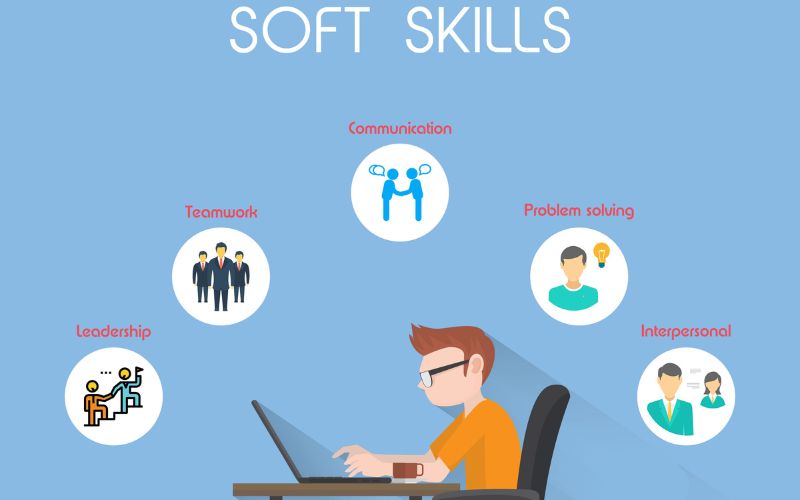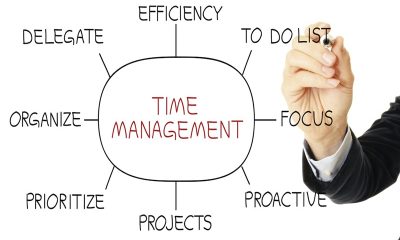Professional Development
The Importance of Soft Skills in Professional Development

In an era where technical prowess often takes the spotlight, the significance of soft skills in professional development cannot be overstated. Soft skills, encompassing communication, teamwork, adaptability, and more, are the linchpin of personal and career growth. This article explores the crucial role of soft skills in professional development, highlighting their impact on career success and overall workplace effectiveness.
Understanding Soft Skills
Communication Skills: The Cornerstone of Success
Teamwork and Collaboration
Adaptability in a Dynamic Landscape
Problem-Solving and Critical Thinking
Emotional Intelligence for Effective Relationships
Leadership and Influence
Conclusion: Elevating Professional Effectiveness
In conclusion, the importance of soft skills in professional development cannot be overstated. While technical expertise opens doors, soft skills are the keys to success within those doors. Effective communication, strong teamwork, adaptability, problem-solving, emotional intelligence, and leadership collectively elevate professional effectiveness. Investing in soft skills enhances careers and fosters a collaborative, innovative, and harmonious workplace.
Professional Development
Staffing for a Greener Future: Solutions from Sustainability & Environmental Management Staffing Companies

In a world increasingly concerned with environmental sustainability, businesses are turning to specialized staffing agencies to build teams focused on eco-conscious practices. Sustainability & Environmental Management Staffing Companies offer tailored solutions for companies committed to greener futures. As sustainability becomes a cornerstone of corporate strategy, the demand for professionals skilled in environmental management continues to rise. These staffing agencies play a pivotal role in bridging the gap between businesses seeking to integrate sustainability into their operations and qualified candidates dedicated to environmental stewardship.
The Rise of Sustainability & Environmental Management Staffing Companies:
The emergence of Sustainability & Environmental Management Staffing Companies mirrors the growing importance of sustainability in corporate agendas. These agencies have recognized the need for specialized recruitment services to address the unique requirements of businesses striving to minimize their environmental footprint. By focusing on sustainability and environmental management roles, these staffing firms offer expertise in sourcing candidates with the right skill sets and values to drive sustainable initiatives forward.
Meeting Industry-Specific Needs:
One of the key strengths of Sustainability & Environmental Management Staffing Companies lies in their ability to understand and cater to industry-specific sustainability challenges. Whether in manufacturing, agriculture, energy, or any other sector, businesses face distinct environmental concerns that require tailored solutions. These staffing agencies excel in identifying candidates with relevant industry experience and expertise in implementing sustainable practices specific to each sector’s requirements.
The Role of Sustainability Experts:
Sustainability professionals play a pivotal role in guiding businesses towards environmentally responsible practices. Sustainability & Environmental Management Staffing Companies specialize in recruiting individuals with expertise in areas such as renewable energy, waste management, and environmental compliance. These experts provide invaluable insights and strategic direction, helping organizations navigate the complexities of sustainability and drive meaningful change within their operations.
Enhancing Corporate Social Responsibility (CSR):
Corporate Social Responsibility (CSR) has evolved to encompass environmental sustainability as a core pillar. Sustainability & Environmental Management Staffing Companies assist businesses in aligning their CSR goals with tangible environmental actions. By recruiting professionals committed to sustainability, companies strengthen their CSR initiatives, demonstrating a genuine commitment to environmental stewardship and social responsibility.
Driving Innovation through Talent Acquisition:
Innovation is essential for advancing sustainability goals and staying ahead in a rapidly changing business landscape. Sustainability & Environmental Management Staffing Companies play a crucial role in driving innovation by connecting businesses with forward-thinking professionals dedicated to environmental sustainability. These individuals bring fresh perspectives and creative solutions to the table, driving continuous improvement and fostering a culture of innovation within organizations.
Navigating Regulatory Compliance:
As environmental regulations become increasingly stringent, businesses must ensure compliance to avoid legal and reputational risks. Sustainability & Environmental Management Staffing Companies provide access to professionals well-versed in environmental laws and regulations, offering guidance on compliance requirements and best practices. By leveraging their expertise, businesses can navigate regulatory complexities with confidence, minimizing potential liabilities and demonstrating a commitment to legal and ethical environmental practices.
Measuring Impact and ROI:
Quantifying the impact of sustainability initiatives is essential for assessing their effectiveness and demonstrating return on investment (ROI). Sustainability & Environmental Management Staffing Companies assist businesses in measuring and evaluating the environmental and financial benefits of their sustainability programs. Through data analysis and performance tracking, companies gain valuable insights into the outcomes of their sustainability efforts, enabling informed decision-making and continuous improvement.
Conclusion:
Sustainability & Environmental Management Staffing Companies are instrumental in supporting businesses on their journey towards a greener future. By connecting companies with skilled professionals dedicated to environmental sustainability, these agencies facilitate the adoption of sustainable practices across industries. As sustainability continues to shape corporate agendas worldwide, partnering with specialized staffing firms becomes essential for businesses committed to driving positive environmental change and securing a sustainable future for generations to come
Professional Development
Placing Purpose: Sustainability & Environmental Management Executive Placement Services

In today’s rapidly evolving business landscape, sustainability and environmental management have become paramount concerns for companies worldwide. The pressing need to address environmental challenges while maintaining profitability has elevated the role of executives specializing in sustainability strategies. Recognizing this demand, specialized executive placement services focusing on sustainability and environmental management have emerged. This article delves into the significance of these services and their role in shaping a more sustainable future.
The Need for Specialized Services:
With sustainability becoming a core business imperative, organizations are increasingly seeking executives who can navigate complex environmental issues and drive impactful change. Sustainability & Environmental Management Executive Placement Services cater to this demand by connecting companies with top-tier talent possessing the expertise and passion for environmental stewardship. These services go beyond traditional recruitment methods, employing industry specialists who understand the nuances of sustainability leadership roles.
Navigating the Green Talent Pool:
Identifying candidates who align with a company’s sustainability goals requires a deep understanding of environmental challenges and innovative solutions. Sustainability & Environmental Management Executive Placement Services leverage their networks and expertise to scout candidates with a track record of implementing sustainable practices across various industries. By conducting thorough assessments and interviews, these services ensure that candidates not only possess the requisite skills but also share the organization’s commitment to environmental sustainability.
Elevating Corporate Responsibility:
Incorporating sustainability principles into corporate strategies is essential for fostering long-term success and mitigating environmental risks. Sustainability & Environmental Management Executive Placement Services play a vital role in elevating corporate responsibility by placing purpose-driven leaders in key roles. These executives integrate sustainability into the core business strategy, driving initiatives that reduce carbon footprint, minimize waste, and promote ethical supply chain practices. By embedding sustainability into the organizational culture, companies can enhance their reputation, attract socially conscious investors, and strengthen stakeholder relationships.
Driving Innovation and Efficiency:
Executives specializing in sustainability and environmental management bring a fresh perspective to organizational challenges, driving innovation and efficiency. By prioritizing eco-friendly practices and resource efficiency, these leaders identify opportunities for cost savings, process optimization, and product innovation. Sustainability-driven initiatives such as renewable energy adoption, circular economy practices, and sustainable product design not only reduce environmental impact but also enhance competitiveness in the market. Sustainability & Environmental Management Executive Placement Services play a pivotal role in connecting companies with visionary leaders who can drive transformative change and position the organization as a sustainability leader in its industry.
Fostering Partnerships for Impact:
Addressing complex environmental issues requires collaborative efforts from various stakeholders, including businesses, governments, NGOs, and communities. Sustainability & Environmental Management Executive Placement Services facilitate partnerships between companies and sustainability leaders, fostering collaboration and collective action towards shared environmental goals. By connecting companies with experts who possess interdisciplinary skills and extensive networks, these services enable organizations to leverage collective expertise, resources, and influence to drive systemic change. Through strategic partnerships and cross-sector collaborations, companies can amplify their impact and contribute to global efforts to address climate change, biodiversity loss, and other sustainability challenges.
Empowering Career Growth:
For professionals passionate about sustainability, executive placement services offer unique career opportunities to make a meaningful difference. By connecting individuals with companies committed to environmental stewardship, these services empower career growth while advancing global sustainability initiatives. Executives placed through these services have the opportunity to lead transformative projects, influence organizational strategy, and drive positive change at scale. Moreover, working for companies with a strong sustainability agenda provides professionals with a sense of purpose and fulfillment, aligning their personal values with their professional aspirations.
Conclusion: Sustainability & Environmental Management Executive Placement Services
In conclusion, Sustainability & Environmental Management Executive Placement Services play a crucial role in addressing the growing demand for sustainability leadership talent in today’s business landscape. By connecting companies with purpose-driven executives who possess the expertise, passion, and vision to drive environmental sustainability, these services contribute to building a more resilient, responsible, and sustainable future. As organizations embrace sustainability as a core business imperative, the role of executive placement services becomes increasingly pivotal in shaping corporate strategies, fostering innovation, and driving collective action towards a sustainable world.
Professional Development
Expert Guidance: Data Analytics & Machine Learning Career Consultants Share Insights

In today’s dynamic job market, securing a rewarding career in data analytics and machine learning requires strategic guidance. Data Analytics & Machine Learning Career Consultants offer valuable insights, helping individuals navigate the complexities of these evolving fields. This article delves into the expertise provided by these consultants, exploring their role, key insights, and strategies for success.
Understanding the Role of Data Analytics & Machine Learning Career Consultants
In the realm of data analytics and machine learning, career consultants play a pivotal role in bridging the gap between aspiring professionals and lucrative opportunities. These experts possess an in-depth understanding of industry trends, skill requirements, and the specific demands of employers. By leveraging their knowledge, individuals can align their career paths with the ever-changing landscape of data-driven technologies.
Insights into Industry Trends and Skill Requirements
Data analytics and machine learning are dynamic domains where staying abreast of industry trends is crucial. Career consultants provide a roadmap to success by offering insights into emerging technologies, tools, and methodologies. They identify the skills that are in high demand, guiding individuals on how to upskill or acquire new competencies. This foresight empowers job seekers to present themselves as valuable assets to potential employers.
Tailoring Resumes and Portfolios for Maximum Impact
Crafting a compelling resume and portfolio is essential in the competitive fields of data analytics and machine learning. Career consultants specialize in optimizing these documents to showcase an individual’s expertise and accomplishments effectively. Through personalized guidance, they help job seekers highlight relevant projects, achievements, and technical skills, ensuring their applications stand out in the crowded job market.
Navigating the Job Search Landscape
The job search process can be overwhelming, but career consultants simplify it by providing strategic advice. They assist in identifying suitable job opportunities, guiding candidates on how to tailor their applications for specific roles. These experts also share insights into networking strategies and industry events, facilitating meaningful connections that can open doors to new career prospects.
Key Strategies for Success in Data Analytics & Machine Learning Careers
Continuous Learning and Adaptability: Consultants stress the importance of staying updated with the latest industry developments. Continuous learning and adaptability to new technologies enhance one’s marketability in the ever-evolving landscape of data analytics and machine learning.
Building a Strong Professional Network: Networking is a cornerstone of success in these fields. Career consultants emphasize the significance of building a robust professional network through industry events, online forums, and social media platforms.
Showcasing Practical Experience: Practical experience is highly valued by employers in data analytics and machine learning. Consultants guide individuals on how to gain hands-on experience through internships, freelance projects, or personal initiatives.
Customizing Job Applications for Relevance: To stand out in the competitive job market, career consultants advise tailoring job applications for relevance. Customizing resumes and cover letters to align with specific job requirements increases the chances of getting noticed by employers.
Expert Guidance: Data Analytics & Machine Learning Career Consultants Share Insights
In the realm of data analytics and machine learning, the expertise of career consultants is invaluable. These professionals offer strategic guidance, empowering individuals to navigate the intricate job market successfully. By understanding industry trends, tailoring application materials, and implementing key strategies, aspiring professionals can embark on a rewarding career journey in these cutting-edge fields.
Conclusion
In conclusion, the guidance provided by Data Analytics & Machine Learning Career Consultants is instrumental in shaping successful career paths in these rapidly evolving fields. By leveraging industry insights, optimizing application materials, and implementing strategic approaches, individuals can enhance their marketability and unlock exciting opportunities. Continuous learning, networking, and customization of job applications are key strategies emphasized by these experts. With their support, aspiring professionals can navigate the complexities of the job market with confidence, positioning themselves as valuable assets in the dynamic landscape of data analytics and machine learning
-

 Industry Insights7 months ago
Industry Insights7 months agoTech Trends Shaping the Future: A Comprehensive Overview
-

 Career Exploration7 months ago
Career Exploration7 months agoSpace Tourism: Opportunities Beyond the Stratosphere
-

 Professional Development7 months ago
Professional Development7 months agoThe Art of Effective Time Management for Career Growth
-

 Job Search Strategies7 months ago
Job Search Strategies7 months agoEffective Time Management During Job Hunting
-

 Job Search Strategies7 months ago
Job Search Strategies7 months agoUsing Job Search Engines to Your Advantage
-

 Job Search Strategies7 months ago
Job Search Strategies7 months agoRefining Your Elevator Pitch for Networking Success
-

 Job Search Strategies7 months ago
Job Search Strategies7 months agoExcel in the Art of Navigating Job Fairs and Networking Events
-

 Industry Insights7 months ago
Industry Insights7 months agoValue-Based Care: Reshaping Healthcare Industry Models































